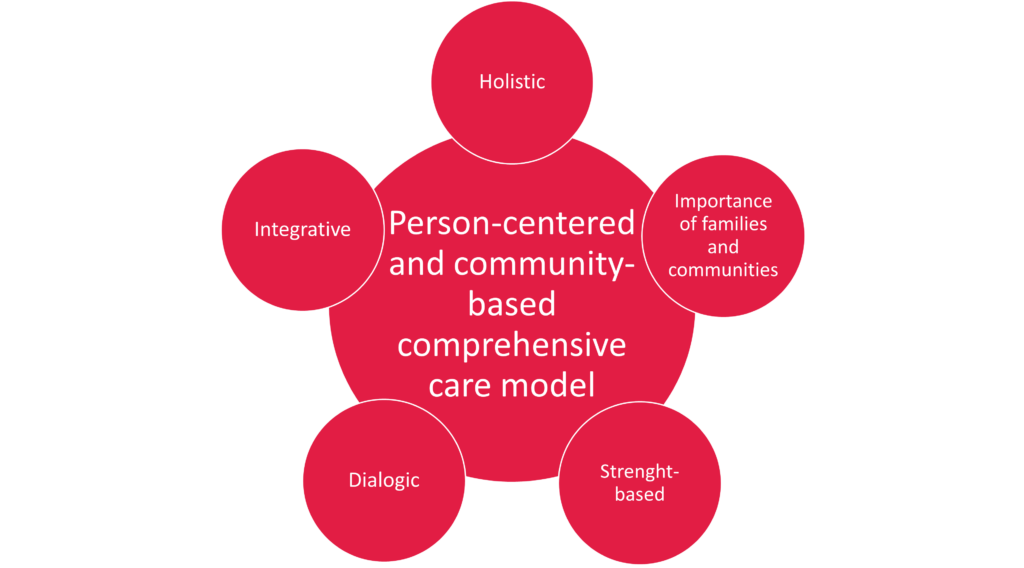
Emma Rautava & Outi Jokinen
The COVID-19 pandemic highlighted the fragility of European social services. The services appear as silos or separate islands, leading to the loss of a holistic perspective in the care of people. Project NEAR (NEw sociAl seRvices – innovative tools and skills for person-centered and community-based social models) aims to support regions to develop or improve person-centered community-based social models. This model focuses on a change in professional praxis.
The project NEAR is funded by the Interreg Europe programme and implemented in 2023-2027. The project operates on two levels: at the regional level in Päijät-Häme and at the interregional level with the partner regions. In Finland, the project is implemented by LAB University of Applied Sciences and Wellbeing services county of Päijät-Häme. The lead partner of the project is Regional Government of Navarre from Spain. There are also partners from the Czech Republic, Belgium, and Italy.
The partners identify approaches and methodologies for professional action that facilitate the change towards the new model. They transfer good practices for example in the training of social service professionals. Professional skills that are crucial for the person-centered and community-based model have been identified also in Päijät-Häme region together with the local stakeholders and clients. This article discusses these professional skills and the process of identifying them.
Person-centered and community-based approach in social services
Social services need to adopt a model of care based on both person-centered and integrated approach (Figure 1). This model respects individual integrity, recognising the person as the main actor in the co-creation of wellbeing with the objective of improving life quality and guaranteeing equal opportunities. The person-centered and community-based social model considers both the person – seeking the maximum development of their capacities – and their relational environments, seeking to maximise the primary support that the person receives. (NEAR 2023a.)

Figure 1. Person-centered and community-based comprehensive care model.
The model change must be accompanied by a change in professional praxis. The role of the social services professionals should move from a role of expert to one of accompaniment, support, guidance, and motivation, giving a new role to service users. The approach focuses on the individual and the holistic needs of the client. The person in need is in the centre of attention, and the participation through the family and the community. Supporting people’s active participation and promoting of self-determination by empowering them to make decisions that affect their wellbeing is important. Community resources and strengths are harnessed to support the empowerment of individuals. The integration and cooperation of different services (employment, social, education, health) and their interoperability is also in the core of the approach. (NEAR 2023a.)
Key professional competences for person-centered and community-based approach
One of the key questions in applying the person-centered and community-based approach is what the most important competences or skills are that professionals need to improve or acquire to apply the new model. Social services professionals’ expertise can be viewed as contextual work, where expertise shapes in the compilation of different specific competencies (cf. Leppänen et al. 2021).
By examining the person-centered and community-based model (NEAR 2023a), the dialogic approach, strengths-based approach and community-based approach were recognised as essential competences for applying the new model. The current state of the competences needed in applying the person-centered and community-based approach was further discussed in a workshop organised in November 2023, where professionals and clients identified necessary competences or skills for applying the new model.
The social services professionals’ role should move to accompaniment, support, guidance, and motivation, giving a new role to service users.
In Päijät-Häme, several methods or tools of dialogic approach are in use, for example open dialogue, participative client documentation and motivational interviewing. Building a trusting relationship between the clients and professionals requires skills but also willingness to engage in a dialogue and continuity in the relationship. In addition, for some clients it might be more convenient to discuss during other activities, which may also enable identifying strengths of the clients. Strengths-based approach was also considered somewhat visible in the daily client work. Strengths and skills of the clients are often discussed and identified. (NEAR 2023b.)

Community-based thinking was discussed through recognising the networks and communities of the client. The significance of family and close ones was emphasized. Still, the current state of community-based approach remained rather unclear. Other key competence identified was the ability to “think across the silos” of services and organisations including for example, good knowledge on the service system, multi-professional work, and networking skills. Finally, ethical competence was perceived significant, including identifying the core values or principles essential for the new model, such as autonomy of clients. However, especially strengthening the community work in social services was called for. (NEAR 2023b.)
Social professionals’ higher education in Finland contains many elements that are essential for applying the person-centered and community-based approach. The key competences of bachelor of social services include, for example acting dialogically in interaction situations and supporting the growth, development, and everyday life of individuals, groups and communities, promoting the inclusion and opportunities or participation of client, client groups and communities, developing client-oriented, research and experience-based work practices, methods and service processes and working in multidisciplinary teams and work communities. (SOAMK 2023.)
Respectively, the dimensions of expertise of the master’s degree in social work include competences relevant for applying the new model. Social workers have a rational view of the human being as part of a society, its communities, institutions, and systems. The phenomena addressed in social work are situated in the relationships between people and in communities. The profession also requires readiness to adopt and develop innovative, forward-looking working methods, procedures, and service processes and to network with partners to develop new approaches. (Lähteinen et al. 2017.)
Strengths-based approach is integrated in both degrees, for example, social pedagogical approach in the bachelor’s degree in social services and empowerment in the master’s degree in social work. The skill to “think across silos” is practiced for example via multi-professional courses involving both health care and social services students and learning events. Dialogic approach is integrated in the education of social welfare professionals. Finally, ethical competence is the core of both degree programs (SOAMK 2023; Lähteinen et al. 2017).
How to strengthen competences in future?
The person-centered and community-based comprehensive care model requires shared understanding of the approach, its benefits, and possible practical applications in different social services, which can be supported via, for example, peer support, coordinated and synchronised development work and training (Nöjd & Rautava 2024). Dialogic approach, strengths-based approach, community-based approach, ethical competence, and the ability and tools to “think across the silos” of services and organisations was recognised as key professional competences for the new model.
Looking more closely at the competences, higher education of social services professionals provides the capacity to apply a person-centered and community-based approach. The competences are common among social services practitioners, but the competences could nevertheless be strengthened. These competences can be trained, but they are also practiced in the everyday work with clients.
Especially the importance of developing community-work skills in Päijät-Häme was recognized in the workshop for local professionals and social services clients. To promote community-based approach, social services roles and practices in enabling and mediating social relationships of individuals should be identified and developed to strengthen the recognition of the significance of the community for clients (Nöjd & Rautava 2024).
Leppänen et al. (2021) also notes that acknowledging the ability and the potential of the community, new resources and opportunities can be created in the social services. Practitioners need to get to know the community to acquire contextual knowledge and to have courage to challenge the existing structures. Furthermore, the role of experts by experience could be emphasized, and possibilities for more “assistive” roles in the social services could be developed to enable more time and interaction with the clients (NEAR 2023b).
The conversation concerning social and health care is ruled by the discourses of cost efficiency, staff shortage and digitalization (Nöjd & Rautava 2024). However, strengthening the competencies of social services professionals in applying person-centered and community-based approaches could offer ways to respond to those challenges.
Authors
Emma Rautava, M.Sc. (Admin.), BA of Social Services, Project Manager, Verso Centre of Excellence on Social Welfare, Wellbeing services county of Päijät-Häme, emma.rautava(at)paijatha.fi
Outi Jokinen, M.Soc.Sc., RDI specialist, LAB University of Applied Sciences, outi.jokinen(at)lab.fi
References
Leppänen, M., Kiviranta, J., Metteri, A., Stepney, P. & Kostiainen, T. (2021) Developing Social Work Competencies to Empower Challenging Communities: From an Empty Foyer to a Shared Social Space in A, Opacic (ed.) Practicing Social Work in Deprived Communities: Competencies, Methods, and Techniques. European Social Work Education and Practice, (pp.121-138). Cited 9 Oct 2024. Available at https://urn.fi/URN:NBN:fi:tuni-202403152891.
Lähteinen, S., Raitakari, S., Hänninen, K., Kaittila, A., Kekoni, T., Krok, S.& Skaffari P. (2017). Social Work Education in Finland: Courses for Competency. Cited 1 Sept 2023. Available at https://www.sosnet.fi/loader.aspx?id=43aacd5d-7a96-44b7-8dcb-62dcd7ea6d65.
NEAR. (2023a). New models of care within the framework of social services. Conceptual framework, review of documents, experiences, and other resources. Project background document.
NEAR. (2023b). Workshop with stakeholders and clients. Documentation. Lahti Diaconia Institute, Lahti. 13.11.2023.
Nöjd, T. & Rautava, E. (2024). Towards person-centered and community-based social services in the Päijät-Häme region. LAB RDI Journal. Cited 9 Oct 2024. Available at https://www.labopen.fi/en/lab-rdi-journal/towards-person-centered-and-community-based-social-services-in-the-paijat-hame-region/
SOAMK. (2023). Competences of Bachelor of Social Services / Universities of Applied Sciences. Cited 9 Jan 2024. Available at https://www.sosiaalialanamkverkosto.fi/wp-content/uploads/2023/06/kompetenssit_amk_englanti.pdf.
Abstract
The COVID-19 pandemic highlighted the fragility of European social services. The services appear as silos or separate islands, leading to the loss of a holistic perspective in the care of people. Social services need to adopt a model of care based on both person-centered and integrated approach.
The model change must be accompanied by a change in professional praxis, moving from a role of expert to one of accompaniment, support, guidance and motivation, giving a new role to service users. In the interregional NEAR (NEw sociAl seRvices) Interreg Europe project professional skills that are crucial for the person-centered and community-based model have been identified also in Päijät-Häme region together with the local stakeholders. The article discusses these professional skills and the process of identifying them.



